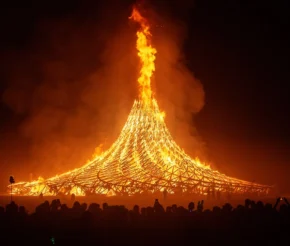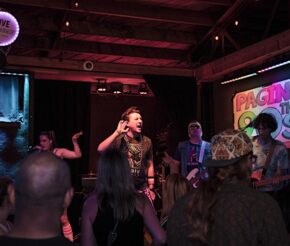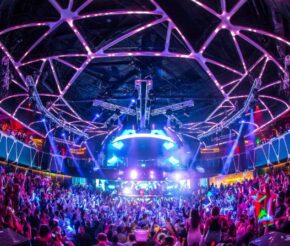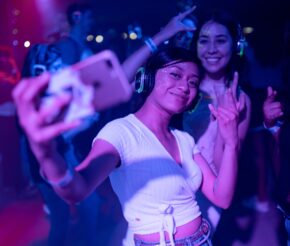- Advertise
-
Subscribe
Are You an Ally or Are You Just Annoying?

In theory, gay clubs are the one place queer people can let loose without having to check their behaviour for fear of being victimized.
It’s why they’re so important – they provide a safe space to a community that is under threat all too often, especially in the nightclub industry.
As UK-based charity, Stonewall reports: ‘1 in 6 LGBT people who visited a café, restaurant, bar or nightclub in the last 12 months have been discriminated against based on their sexual orientation and/or gender identity’.
And let’s not forget that this number is much higher in other countries, like the 69 nations where homosexuality is still criminalised, for one.
Gay clubs are hubs of solidarity and self expression
Gay clubs are hubs of solidarity and self-expression – it’s essential that nothing gets in the way of that.
But many feel like they could be under threat from an increasingly common phenomenon. Let’s call it, ‘the straight invasion’.
Back in 2014, queer columnist, June Thomas, was already asking straight America to re-evaluate its newfound clubbing habits.
‘You can go wherever you like, but should you?’ – she prompted, issuing a question that has since grown more relevant as many LGBTQ+ nightclubs have closed down, being replaced by straight-friendly (‘mixed’) counterparts.
Gay clubs are safe spaces because they’re run and populated by queer people

In principle, gay clubs are safe spaces because they’re populated by queer people. When straight people enter them, their presence can compromise that carefully crafted environment.
When we got in touch with Akeil Onwukwe-adamson, founder of Queer Bruk (an LGBTQ+ night for POC in London), he told us about incidents where straight people had shown up at his event and “gotten aggressive to the women, weird with the gay men, and ultimately needed to be kicked out”.
As with most things, there’s levels to it. Sometimes the threat is physical when it comes in the form of violence. Other times it’s psychological, when straight clubbers fetishize or alienate queer people in the spaces they call their own.
There is a difference between imposing yourself and being invited in
However, with societies becoming less and less divided along lines of sexual orientation, it’s not uncommon for straight people to attend gay nights for well-intentioned reasons as well.
As sociologist, Amin Ghaziani, explains in his case-study, There Goes the Gayborhood?(2014): since straight and gay people commonly live side by side in Western societies, it makes less and less sense to segregate them socially.

As Akeil pointed out, LGBTQ+ venues and club nights can adapt to this reality:
“For us and our Queer Bruk events, our aim has ALWAYS been to make it a space where no one will be turned away […] we have many straight people who come with their friends, and are true allies”
It’s important to have queer spaces that prioritise and protect the LGBTQ+ community. It’s also important to make them inclusive to all of the people they represent – including those with straight friends who might not have anyone else to bring along.
The crux of the matter lies in remembering the fact that there’s a difference between imposing yourself on a space and being invited into it.
If you go as a friend and ally, think about how you can do so respectfully
Straight people: you might want to go to a queer night, but do you need to?
Considering how few of them there actually are (comparatively speaking), it’s important to evaluate whether your reason for taking up space is a good one.
Say you do decide to go as a friend and an ally, you should also think about how you can do so respectfully.
Try asking yourself whether it’s appropriate to go to a gay bar and lock lips with your straight partner all night? Doesn’t that just radiate the assumption that this night, like pretty much every other night, is about you?
And what about reacting badly to someone of the same sex hitting on you? Sure, it might not be a common occurrence for you, but you’re in a gay bar, what did you expect?

Privilege makes you assume that you should always be centre stage
Privilege is a strange beast, it makes you assume that just because you’re used to seeing yourself represented, you never need to step down from centre stage and let someone else take priority.
But that’s the whole point of queer-focussed nights, as Akeil reminded us:
“What we speak on is if you’re going to come as a non-black/non-queer person, you better understand that this night is not going to be catered to you. This night is FOR and by QTIPOC and you will act accordingly”
Ultimately, gay clubs and bars play a vital role in allowing queer people to find their community, access support networks, and express themselves without fear of persecution.
Keeping straight people out of these spaces isn’t about segregation, it’s about creating and preserving an environment where queer people feel free to exist in whatever way they see fit.
If you’re a straight person who’s making the decision to attend an LGBTQ+ event, it’s important to step back and think about how you should go about it (or if you even need to go in the first place).
A little thought goes a long way – if you’re taking up space at a queer event, think carefully about why and how you’re doing it.





